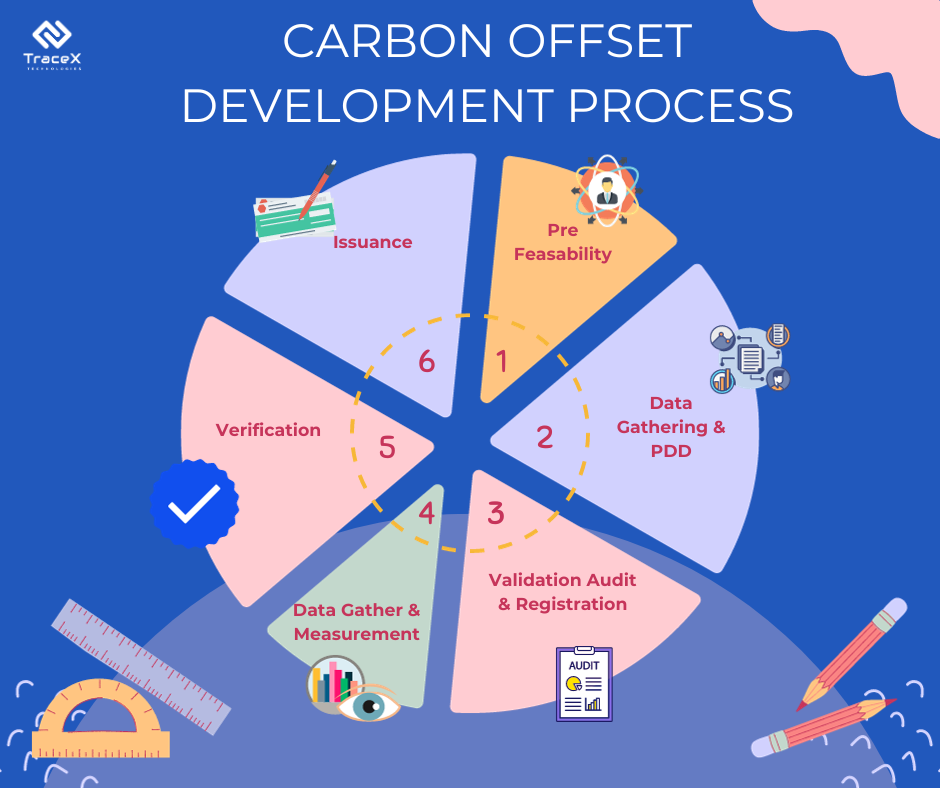Contact: +91 99725 24322 |
Menu
Menu
Quick summary: Explore the game changing DMRV Solutions for carbon project developers. Dive into the innovative features, seamless data collection, and the transformative impact of TraceX on carbon project development. Uncover a new era of efficiency, transparency, and sustainability in the carbon market.

Amidst the turbulence, a new era of solutions emerges. Digital Monitoring, Reporting, and Verification (DMRV) solutions and blockchain integration rise as beacons of hope for carbon project developers, promising streamlined verification, enhanced data security, and a competitive edge in the market. These innovations hold the potential to transform challenges into opportunities, ensuring the integrity and success of carbon offset projects.
According to reports from Thallo, there could be $2.6 BILLION Total cost of delays for project developers until 2030.
Join us as we delve into the depths of challenges faced by carbon project developers in the VCM. Uncover the nuances of verification complexities, data security concerns, and the need for market competitiveness. Discover how DMRV solutions are charting a course towards a more transparent, secure, and competitive Voluntary Carbon Market.
Carbon project developers are the architects of environmental change. They are like the eco-friendly engineers who design and build projects aimed at reducing greenhouse gas emissions and combatting climate change. Their role is all about finding smart and creative ways to make our world greener. These developers work to capture carbon emissions, prevent deforestation, and create cleaner energy sources, all of which are crucial steps toward a more sustainable planet. In essence, they are the driving force behind many of the projects that help us breathe cleaner air, preserve our forests, and slow down the warming of our beloved Earth. So, when you see a wind farm or a reforestation project, remember that carbon project developers are the heroes working behind the scenes to make it happen.
Carbon offset projects play a pivotal role in mitigating climate change by reducing or removing greenhouse gas emissions from the atmosphere. Carbon Project developers are the driving force behind the conception, planning, and execution of these projects. Carbon project developers embark on a quest for environmental sustainability in the VCM. Yet, the journey is fraught with challenges that demand strategic navigation.
The VCM poses a series of challenges for carbon project developers, creating waves of uncertainty. From intricate verification processes to concerns about data security and the need for market differentiation, these challenges form the undercurrents that can disrupt the smooth sailing of carbon offset initiatives.
The mission of carbon project developers is paramount: to combat climate change and drive sustainability efforts by initiating projects that reduce carbon emissions. However, these modern-day environmental heroes face a multitude of challenges in their quest to create a greener world. Let’s delve into the significant hurdles they encounter and the strategies employed to overcome them.
Navigating the world of carbon regulations is like deciphering a global puzzle. Developers must grapple with various international and regional rules, each with its own set of requirements and complexities.
For instance, the Clean Development Mechanism (CDM) under the Kyoto Protocol has its rules, while the Paris Agreement introduces a different framework.
These evolving standards demand meticulous compliance. When policies change, it can have a profound impact on project development. For instance, a shift in emissions reduction targets may require developers to adapt their projects to align with new goals. To overcome these challenges, developers stay vigilant, keep abreast of policy changes, and adapt their strategies accordingly.
Securing funding for carbon offset projects is akin to finding a needle in a haystack. Many investors perceive such projects as risky endeavors. Moreover, revenue streams can be unpredictable due to market dynamics. Carbon credits, which represent emissions reductions, can fluctuate in value.
To tackle this, developers explore various financial support sources. Impact investments, where investors prioritize both financial returns and positive environmental impact, have become increasingly popular. Partnerships with sustainability-focused organizations offer another avenue. These partnerships not only provide funding but also valuable expertise and networks. By diversifying their funding sources and embracing innovative investment models, developers can navigate these financial uncertainties with greater ease.
Behind the scenes of carbon projects lie intricate technical aspects. Developers must accurately measure, monitor, and verify emissions reductions, ensuring the credibility of their projects. However, challenges arise in data collection, accuracy, and transparency. Here, technology comes to the rescue. Innovations like satellite monitoring and blockchain technology enhance data accuracy and transparency. Satellites provide real-time emissions data, reducing reliance on manual measurements. Blockchain ensures the tamper-proof recording of emissions reductions, enhancing transparency.
The journey from project identification to execution is riddled with hurdles. Developers grapple with complexities such as stakeholder engagement and community involvement. Local communities may have diverse interests and concerns, necessitating effective communication and collaboration. To address these challenges, developers employ efficient project management strategies. They meticulously plan, transparently communicate, and actively engage with stakeholders. By fostering a sense of ownership and inclusion among communities, developers can navigate these complexities smoothly.
Carbon markets are not immune to volatility. Fluctuating carbon credit prices can impact project economics. Developers must be prepared to adapt to market dynamics and manage associated risks. Strategies like risk mitigation and long-term planning can help developers navigate market uncertainties. By diversifying revenue streams and exploring options for carbon credit storage, they can reduce their exposure to market volatility.
Effectively communicating the benefits of carbon offset projects to stakeholders is another challenge. Building trust with investors and local communities hinges on transparency. Transparent reporting and clear messaging are paramount. Successful stakeholder engagement entails active listening and collaboration. Developers must convey the positive impact of their projects and actively involve stakeholders throughout the project’s lifecycle. By fostering trust and meaningful partnerships, developers can overcome these communication challenges.

In the realm of carbon offset project development, technology emerges as the unsung hero, equipping project developers with powerful tools to surmount myriad challenges. One such solution is DMRV a cutting-edge digital tracking and reporting tool that revolutionizes the way developers navigate complex hurdles.
Trace Carbon serves as a beacon of innovation, offering a comprehensive suite of features that streamline project management, data accuracy, and transparency. This digital marvel ensures that carbon offset projects remain on course, driving meaningful environmental change.
Trace Carbon’s digital prowess shines in the realm of data collection, measurement, and monitoring. Gone are the days of manual measurements and data discrepancies. With satellite technology at its core, Trace Carbon provides real-time emissions data, elevating accuracy and efficiency to unprecedented levels. This means developers can confidently present verifiable results to stakeholders, bolstering trust and credibility. Plus, blockchain technology secures emissions reduction records, making them tamper-proof and transparent. With Trace Carbon, the tedious aspects of project development are streamlined, allowing developers to focus on what truly matters—creating a more sustainable world.
In the pursuit of a greener and more sustainable world, carbon project developers stand as the pioneers of change, tackling the challenges of our time with innovation and determination. As we conclude our exploration of the hurdles they face and the ingenious solutions they employ, it becomes clear that their role is not just pivotal; it’s transformative.
Regulatory and compliance challenges may be complex, but developers remain vigilant and adaptable, ensuring their projects comply with ever-evolving standards. Financial hurdles are overcome by diversifying funding sources and embracing innovative investment models, allowing these projects to thrive. Technical challenges find their match in technology and innovation, which enhance measurement accuracy and transparency.
Project development complexities are addressed through efficient management and community engagement, while market volatility is tamed through risk mitigation and long-term planning. Effective communication and transparency build trust with stakeholders, ensuring projects are embraced by investors and communities alike.
The journey of carbon project developers is marked by resilience and progress. They not only surmount obstacles but also serve as beacons of hope in the fight against climate change. Their innovative spirit, coupled with the support of technology and the determination to create a sustainable future, makes their mission one of profound significance. Together, they remind us that no challenge is insurmountable when driven by the collective will to protect our planet.
